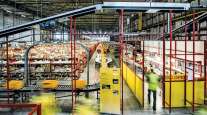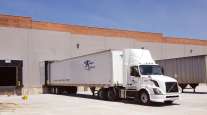DHL to Run New $44 Million Campbell Soup Logistics Hub

The Campbell Soup Co. broke ground Aug. 8 on a $44 million distribution center in Hancock County, Ohio, that officials said will serve as the company’s future Midwest distribution hub.
Officials with Camden, N.J.-based Campbell said they expect to employ 220 people at the hub when it opens early next year. The 740,000-square-foot facility will be operated by transportation and logistics firm DHL Supply Chain.
“We’re moving to a model that a lot of consumer product companies use, which is basically to ship products from our manufacturing sites to distribution centers with access to good ground transportation and rail,” said Mark Cacciatore, vice president of supply chain for Campbell.
Campbell already contracts with DHL at a similar distribution center in Southern California and recently opened a second DHL-managed facility in the Fort Worth area. The Findlay facility will be its third; Cacciatore said the company also is actively looking to add a fourth distribution center in the Southeast.
The new distribution center just north of Findlay will be Campbell’s third facility in northwest Ohio.
The company operates a soup and juice factory in Napoleon and a plant that makes crackers and cookies for its Pepperidge Farm brand in Willard, Ohio, which is about 65 miles southeast of Toledo. Together those two sites employ more than 2,000 people.
Campbell said products from the Napoleon factory, which is the largest in the company’s plant network, will be shipped to the new distribution center along with items from a number of other plants across the broader region.
The Blanchard Valley Port Authority helped secure the project by negotiating a deal to save Campbell significant expense on construction of the facility. Construction and initial ownership of the building was shifted to the port authority in a move that eliminates sales tax from construction materials.
Jerry Arkebauer, administrative consultant for the Blanchard Valley Port Authority, said Campbell bought the land and leased it back to the port authority. To finance construction, the port issued up to $37.5 million in bonds that later were bought by a Campbell subsidiary.
The port itself is building the distribution center and will lease it back to Campbell for four years. Then Campbell will buy it for $10,000.
Arkebauer said the port authority has used a similar process for other projects in recent years, including Marathon Petroleum Corp.’s expansion in downtown Findlay and the nearby McLane Co. Inc. distribution center.
“Companies have a lot of choices where they’re going to build. We know for a fact McLane and Campbell looked at Indiana,” he said. “We know for a fact Indiana does not have this kind of incentive available. Other state incentives are pretty comparable. A lot of the location decisions are based on location and access to interstates ... but we think the ability to abate or exempt sales taxes from construction materials is a real simple incentive that companies recognize really quickly how much it will reduce their cost of construction.”
While the county will take a small short term hit in sales tax collections, Arkebauer said the long-term benefits from payroll taxes far outweigh the cost.
Campbell said the land and building will cost about $40 million. The company expects to spend an additional $4 million on equipment for the facility.
“The Findlay site was just excellent because of the easy access to highway transportation, as well as rail where we can go intermodal to the West Coast,” Mr. Cacciatore said.
Distributed by Tribune Content Agency, LLC




